After manoeuvring this way and that for well over a year, Sergio Massa has finally got his hands on the post he coveted most and is now the economy minister of a flat-broke country whose woes seem bound to get much worse in the coming weeks. So why did he want the job so much? Presumably, because he took it for granted that, if given more power than Martín Guzmán or Silvina Batakis ever had, he would be able to save Argentina from disaster and in return a grateful populace would be delighted to make him president.
What are Massa’s chances of success? Many sober onlookers think they are approximately zero. The problems confronting him are so overwhelming that, after glancing at the available statistics, several respected economists told President Alberto Fernández they would rather not get involved and are even refusing to serve in an advisory capacity. However, unlike them, Massa is a born optimist who brushes off warnings from those who whisper in his ear “be careful what you wish for”. He must see himself seizing the ramshackle economy by the scruff of the neck and quickly turning it into a powerhouse. What is more, like many other people, he feels that the country is fast approaching a turning point and wants to be seen as one of the first to march off in the direction it will eventually take,
On the political front, some things are going well for him. At long last, Cristina Fernández de Kirchner’s baleful influence is fading and with it, her ability to squeeze farmers and stop businessmen from doing their stuff, while thwarting efforts to bring down public spending and slow inflation by printing fewer pesos. If her approval rating drops below twenty percent, as could well happen fairly soon, she will cease being able to make much of the country dance to her tune, as it has been doing ever since, after emerging from deepest Patagonia along with her husband Néstor Kirchner, she became president and looked for guidance to dictators ruling Cuba and Venezuela.
By all accounts, the ongoing corruption trial Cristina is facing seems likely to prove devastating both for her and for the shady characters and cranks supporting her. Without her patronage, the personal future of many of the latter could be bleak indeed.
Massa must be fully aware that, unless what remains of the Kirchnerite movement gets buried with a stake through its heart to prevent it from reviving, Argentina will end up as a huge shanty town dotted with the expensive villas of politicians, trade union bosses, drug lords and the individuals who handle the large sums of money needed to keep the poverty-stricken from starving to death. As he is constantly being reminded, before deciding it would be in his interest to help Cristina return to the centre of power and he became a minority shareholder in her enterprise, he loudly swore he would do his utmost to see she got sent to jail for looting the country and, in addition to that, would rid the public administration of activists attached to the La Cámpora mutual aid association who had already colonized much of it. There is no reason to think he has changed his mind, though he does make out that what he said back then was merely campaign rhetoric and so should not be taken too seriously.
What, apart from himself, does Massa really believe in? It would appear that he would very much like to model himself on the Brazilian Fernando Henrique Cardoso who, as president just over twenty years ago, managed to put an end to a period of sky-high inflation and as a result earned himself an enviable international reputation; among other things, in 1997 Queen Elizabeth made him an honorary Knight Grand Cross if the Order of the Bath. Closer to home, another model must be Domingo Cavallo. His once impressive image was badly dented in Argentina by his failure to save Fernando de la Rúa’s government, but his currency-board scheme did give the country almost a decade of price stability which should have made it far easier to dismantle the Peronist socioeconomic model with which it was burdened.
Unfortunately, for Massa to do the same as Cavallo did then he would first need to pile up many billions of US dollars. This is something he is now trying to do, but for understandable reasons few people either here or abroad are willing to let the money they handle get anywhere near a country ruled by politicians who often makes a point of refusing to pay its debts for what they insist are unassailable humanitarian motives.
Opposition leaders hope Massa does well enough to ensure that the next government receives an economy which is in rather better shape than it is today, but they do not want to see him become excessively popular as a result. They would also like the new “superminister” to accustom the population to belt-tightening so that few people will object that much when they set about doing much the same in a far more vigorous fashion. Among them, the consensus seems to be that at most he could achieve some partial successes by applying the kind of measures they themselves have in mind.
Their principal fear is that Massa will somehow contrive to delay the collapse many think is inevitable so it comes when they are in office and can be blamed, as Mauricio Macri and his team-members were, for wrecking the economy and impoverishing millions of honest, hard-working citizens. They are well aware that the Peronists have made a habit of bequeathing to their successors ticking time-bombs programmed to go off when they are somewhere else. In the weeks preceding their departure from power in late 2015, Cristina and Axel Kiciloff did this in order to make life even harder for Macri than would otherwise have been the case. The pair of them would dearly like to repeat that performance, but time is running out for them and, with meaningful elections still over a year away, they fear the economy could go under while they are in charge.
As far as Cristina and her acolytes are concerned, Massa –like Cardoso and Cavallo – is a “neoliberal” who is overfond of the United States, but they do seem to realise that, with inflation picking up steam, something really should be done to rein in public spending. In less dangerous circumstances, the Kirchnerites would already be staging violent mass protests against what the new economy minister clearly intends to do, but they fear that they would be among the principal victims of any riots that left blood in the streets and, for few days at least, will probably hold their fire.







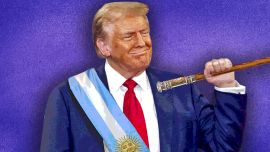

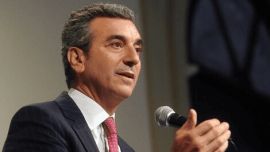




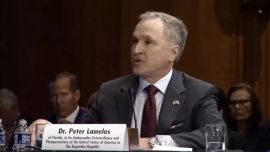

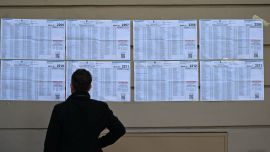




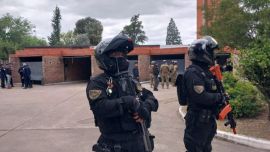
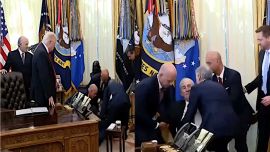
Comments